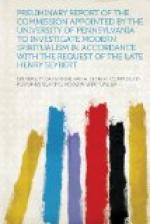That little has been in the presence of a lady in Leipsic through whom raps occurred, and psychography. This last phenomenon consisted in communication through a little contrivance, furnished with an index or pointer, which answered questions by pointing to letters laid out before it. This it did when the lady placed her hand on the machine. The questions were “usually” not asked mentally, but spoken out. There were no tests applied to these phenomena, no conditions of exact investigation. Professor Scheibner “holds suspicion of conscious deception to be out of the question.”
5. Professor Zoellner was, said Professor Scheibner, a man of keen mind, but in his investigations apt to see “by preference” what lay in the path of his theory. He could “less easily” see what was against his theory. He was childlike and trustful in character, and might easily have been deceived by an impostor. He expected everyone to be honest and frank as he was. He started with the assumption that Slade meant to be honest with him. He would have thought it wrong to doubt Slade’s honesty. Professor Zoellner, said Professor Scheibner, set out to find proof for four-dimentional space, in which he was already inclined to believe. His whole thought was directed to that point.
6. Professor Scheibner thinks that the mental disturbance under which Zoellner suffered later, might be regarded as, at this time, incipient. He became more and more given to fixing his attention on a few ideas, and incapable of seeing what was against them. Towards the last he was passionate when criticized. Professor Scheibner would not say that Professor Zoellner’s mental disturbance was pronounced and full-formed, so to speak, but that it was incipient, and, if Zoellner had lived longer, would have fully developed. Zoellner himself, “whose brothers and sisters frequently[A] suffered from mental disease, often feared lest a similar fate should come upon him.”
[Footnote A: “Dessen Geschwister mehrfach” etc.—the words may be taken in two senses.]
7. Professor Scheibner gives no opinion on Spiritism. He can only say that he cannot explain the phenomena that he saw.
8. Professor Weber, said Professor Scheibner, “attended the Zoellner-Slade experiments under the same circumstances as he (Scheibner) himself.”
9. Professor Zoellner’s book, said Professor Scheibner, would create the impression that Weber and Fechner and he agreed with Zoellner throughout in his opinion of the phenomena “and their interpretation;” but this, he said, is not the case.
HALLE a.S., July 5th, 1886.
So much for the information given by Professor Scheibner. It now remained to see Professor Wilhelm Weber, and on the evening of July 12th I called upon him at his house in Goettingen. Of his statements I took notes during my conversation with him, as in the former instances, and copied and arranged them the same evening at my hotel. Professor Weber is now eighty-three years old, and does not lecture. He is extremely excitable and somewhat incoherent when excited. I found it difficult to induce him to talk slowly enough, and systematically enough, for me to make my notes. Professor Weber said:




